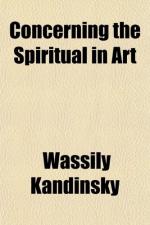DEDICATED TO THE MEMORY OF ELISABETH TICHEJEFF
PART 1: ABOUT GENERAL AESTHETIC
I. INTRODUCTION
Every work of art is the child of its age and, in many cases, the mother of our emotions. It follows that each period of culture produces an art of its own which can never be repeated. Efforts to revive the art-principles of the past will at best produce an art that is still-born. It is impossible for us to live and feel, as did the ancient Greeks. In the same way those who strive to follow the Greek methods in sculpture achieve only a similarity of form, the work remaining soulless for all time. Such imitation is mere aping. Externally the monkey completely resembles a human being; he will sit holding a book in front of his nose, and turn over the pages with a thoughtful aspect, but his actions have for him no real meaning.
There is, however, in art another kind of external similarity which is founded on a fundamental truth. When there is a similarity of inner tendency in the whole moral and spiritual atmosphere, a similarity of ideals, at first closely pursued but later lost to sight, a similarity in the inner feeling of any one period to that of another, the logical result will be a revival of the external forms which served to express those inner feelings in an earlier age. An example of this today is our sympathy, our spiritual relationship, with the Primitives. Like ourselves, these artists sought to express in their work only internal truths, renouncing in consequence all consideration of external form.
This all-important spark of inner life today is at present only a spark. Our minds, which are even now only just awakening after years of materialism, are infected with the despair of unbelief, of lack of purpose and ideal. The nightmare of materialism, which has turned the life of the universe into an evil, useless game, is not yet past; it holds the awakening soul still in its grip. Only a feeble light glimmers like a tiny star in a vast gulf of darkness. This feeble light is but a presentiment, and the soul, when it sees it, trembles in doubt whether the light is not a dream, and the gulf of darkness reality. This doubt, and the still harsh tyranny of the materialistic philosophy, divide our soul sharply from that of the Primitives. Our soul rings cracked when we seek to play upon it, as does a costly vase, long buried in the earth, which is found to have a flaw when it is dug up once more. For this reason, the Primitive phase, through which we are now passing, with its temporary similarity of form, can only be of short duration.




